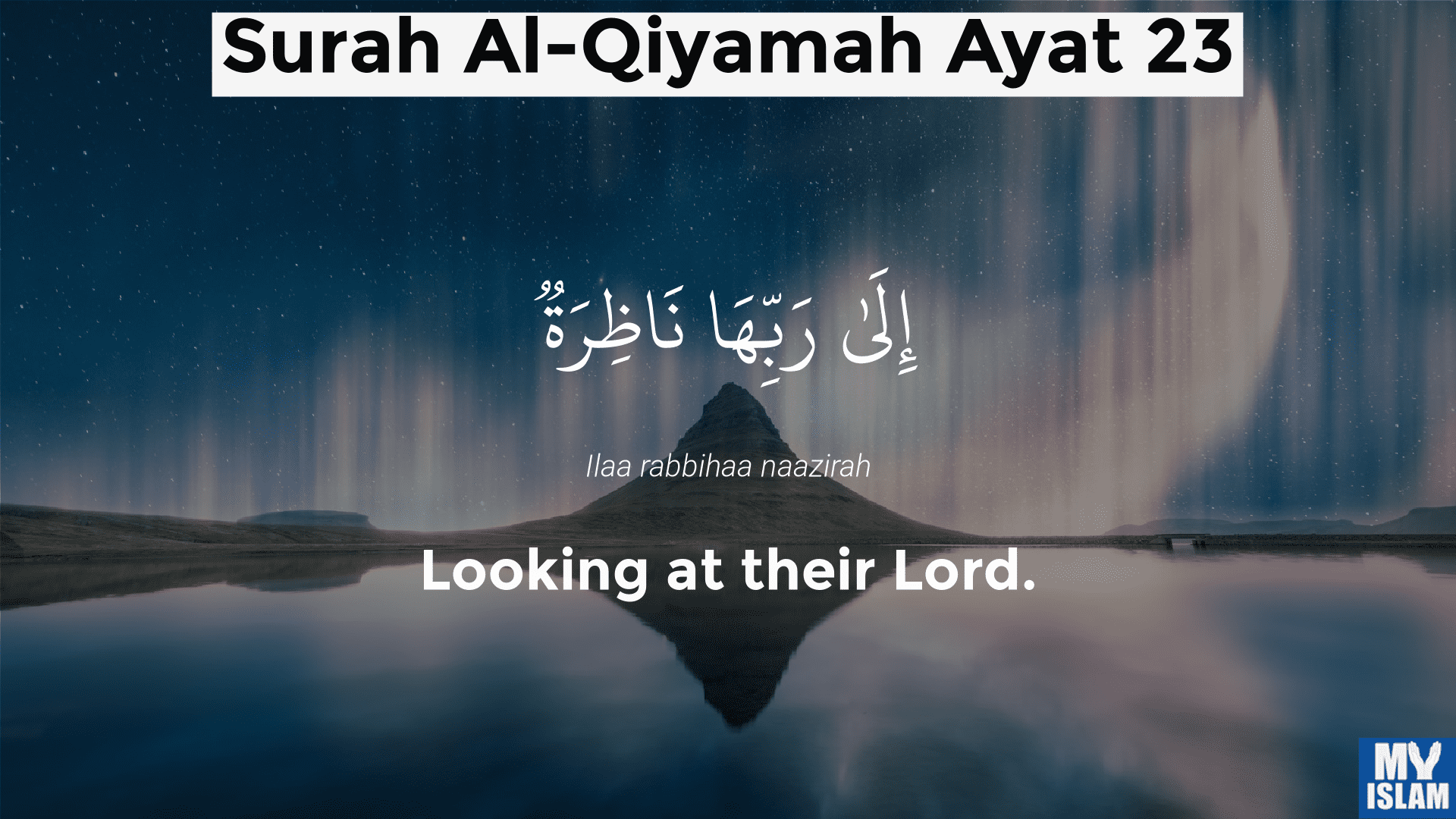Surah Qiyamah Ayat 19 in Arabic Text
English Translation
Here you can read various translations of verse 19
Then upon Us is its clarification [to you].
Nay more, it is for Us to explain it (and make it clear):
then it will be for Us to explain it.
Then it is for Us (Allah) to make it clear to you,
Then lo! upon Us (resteth) the explanation thereof.
Thereafter surely upon Us is its evident (exposition).
and We shall make it clear.
پھر اس کا واضح کر دینا ہمارے ذمہ ہے
Quran 75 Verse 19 Explanation
For those looking for commentary to help with the understanding of Surah Qiyamah ayat 19, we’ve provided two Tafseer works below. The first is the tafseer of Abul Ala Maududi, the second is of Ibn Kathir.
Ala-Maududi
(75:19) then it will be for Us to explain it.[13]
13. This gives the feeling, and some early commentators have also given expression to the same, that probably in the beginning the Messenger (peace be upon him) of Allah used to ask of the Angel Gabriel the meaning of a verse or a word or a command of the Quran even in the very midst of the revelation itself. Therefore, the Prophet (peace be upon him) was not only given the instruction that he should listen quietly to revelation when it came down to him, and assured that its each word would be preserved in his memory precisely, and he would be enabled to recite the Quran exactly as it was revealed, but at the same time it was also promised that he would be made to understand the meaning and intention of each command and each instruction of divine revelation.
This is a very important verse, which proves certain fundamental concepts which, if understood well, can protect one against the errors which some people have been spreading before as they are spreading them today.
First, it clearly proves that the Prophet ((peace be upon him) did not receive only the revelation which is recorded in the Quran but besides that he was also given such knowledge by revelation as is not recorded in it. For, if the meaning and intention of the commandments of the Quran, its allusions, its words and its specific terms, which the Prophet (peace be upon him) was made to understand had been recorded in the Quran, there was no need to say that it was also Allah’s own responsibility to explain its meaning, for it should then be there in the Quran itself. Hence, one will have to admit that the explanations which were given by Allah of the meanings of the contents of the Qur’an, were in any case in addition to the words of the Quran. This is another proof of the secret revelation to the Prophet (peace be upon him) which the Quran provides. (For further proofs of this from the Quran, see our book Sunnat ki Aaini Haithiyat pp. 94-95 and pp. 118-125).
Secondly, the explanation of the meaning and intention of the Quran and of its commandments that was given by Allah to the Prophet (peace be upon him), was given for the purpose that he should make the people understand the Quran by his word and deed according to it and teach them to act on its commands. If this was not the object, and the explanation was only given so that he may restrict its knowledge to himself, it was then an exercise in futility, for it could not help in any way in the performance of the prophetic duties. Therefore, only a foolish person could say that this explanatory work had no legal value at all. Allah Himself has said in (Surah An-Nahl, Ayat 44): And O Prophet, We have sent down this admonition to you so that you may make plain and explain to the people the teaching which has been sent for them. For explanation, (Surah An-Nahl, ayat 44) note 40. And at four places in the Quran Allah has stated that the Prophet’s task was not only to recite the verses of the Book of Allah but also to teach the Book. (Surah Al-Baqarah, Ayat 129); (Surah Al-Baqarah, Ayat 151); (Surah Aal-Imran, Ayat 164); (Surah Al-Jumuah, Ayat 2). We have fully explained all these verses at pp. 74-77 of Sunnat ki Aaini Haithiyat. After this, how can a believer of the Quran deny that the Quran’s correct and authoritative, as a matter of fact official, explanation is only that which the Prophet (peace be upon him) has given by his word and deed, for it is not his personal explanation but the explanation given by the God Who sent down the Quran to him. Apart from this, or leaving this aside any person who explains a verse, or a word, of the Quran according to his personal whim and desire, commits a boldness which no true believer could ever commit.
Thirdly, even if a person has read the Quran only cursorily, he cannot help feeling that there are many things in it whose actual meaning and intention cannot be understood by a reader of Arabic only from the words of the Quran, nor can he know how to act on the commands enjoined in them. Take the word salat for instance. The act which has been most stressed by the Quran after the affirmation of faith is the act of salat. But no man only with the help of the dictionary can determine its actual meaning. At the most what one can understand from the way it has been repeatedly mentioned in the Quran is that this Arabic word has been used in some special terminological sense, and it probably implies some special act which the believers are required to perform. But merely by reading the Quran no reader of Arabic can determine what particular act it is, and how it is to be performed. The question: If the Sender of the Quran had not appointed a teacher from Himself and explained to him the precise and exact meaning of this term and taught him the method in full detail of implementing the command of salat, could there be even two Muslims in the world who would have agreed on one method of acting on the command of salat just by reading the Quran. The reason why Muslims have been performing salat in one and the same way, generation after generation, for more than 1500 years, and the way millions and millions of Muslims are carrying out the command of salat similarly in every part of the world, is that Allah had not only revealed the words of the Quran to His Messenger (peace be upon him) but had also explained to him fully the meaning of those words and the same meaning he taught to the people who accepted the Quran as the Book of Allah and him as the Messenger (peace be upon him) of Allah.
Fourthly, the means of knowing the explanation of the words of the Quran that Allah taught His Messenger (peace be upon him) and the Messenger (peace be upon him) his ummah by word and deed, is none but the Hadith and the sunnah, The Hadith implies the traditions which the earliest followers passed on to the later generations about the sayings and acts of the Messenger (peace be upon him) on sound authority, and the sunnah implies the way of life which became prevalent in the individual and collective life of the Muslims by the Messenger’s (peace be upon him) oral and practical teaching, the details of which have been bequeathed by the former to the latter generations by reliable traditions as well as seen by them practically in the life of the earliest followers. The person who refuses to acknowledge this means of knowledge, in fact, says that Allah after taking the responsibility of explaining the meaning of the Quran to His Messenger (peace be upon him) had, God forbid, failed to fulfill His promise. For this responsibility had not been taken to explain the meaning only to the Messenger in his personal capacity but for the purpose that the ummah also be made to understand the meaning of the divine Book through the agency of the Messenger (peace be upon him). And as soon as the Hadith and the sunnah are denied to be a source of law, it virtually amounts to saying that Allah has failed to carry out His responsibility. May Allah protect us froth such blasphemy. To the one who argues that many people had also fabricated Hadith, we would say that fabrication of Hadith itself is a major proof of the fact that in the beginning the entire ummah gave the sayings and acts of the Messenger (peace be upon him) the status of law, otherwise why should the people who wanted to spread error have fabricated false Hadith. For only those coins are counterfeited which are current in the bazaar; nobody would print paper currency which had no value in the bazaar. Then, those who say such a thing perhaps do not know that this ummah had seen to it from the very beginning that no falsehood was ascribed to the holy man whose sayings and acts had the status of law, and as the danger of ascribing false things to him increased, the wellwishers of the ummah made greater efforts to distinguish the genuine from the counterfeit. The science of distinguishing the genuine from the false traditions is a unique science invented and developed only by the Muslims. Unfortunate indeed are those who without acquiring this science are being misled by the western orientalists to look upon the Hadith and the sunnah as unauthentic and u
Ibn-Kathir
The tafsir of Surah Qiyamah verse 19 by Ibn Kathir is unavailable here.
Please refer to Surah Qiyamah ayat 16 which provides the complete commentary from verse 16 through 25.
Quick navigation links






